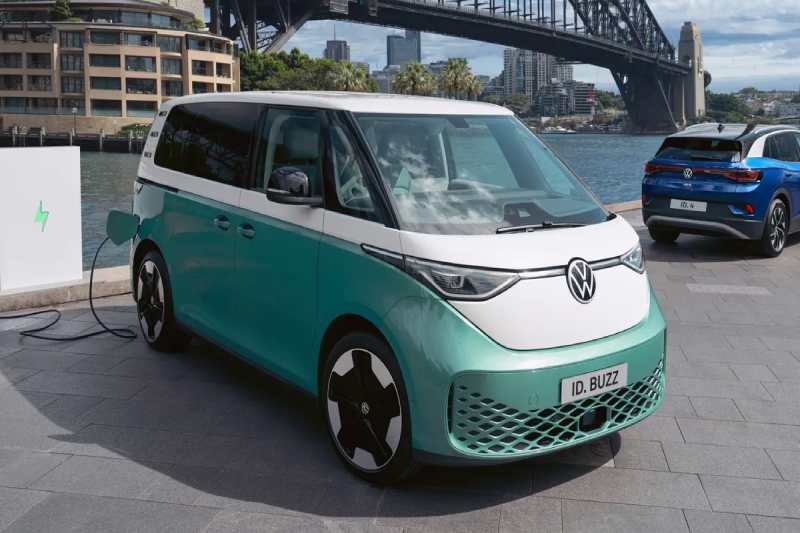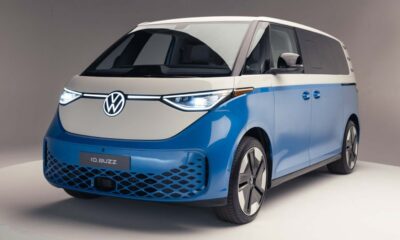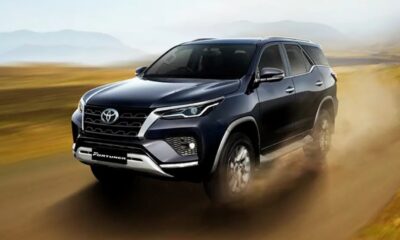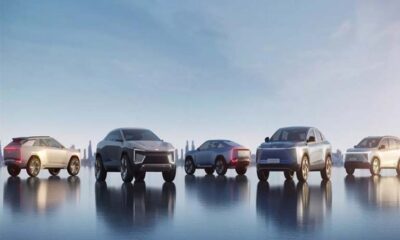Business
Famous EVs: these are the latest models that are coming to Australia for the first time

Major automakers are getting ready to introduce electric vehicles to Australia for the first time, a move that some experts predict will make drivers less devoted to their brands.
In what is predicted to be a breakthrough year for electric vehicles, near-silent sports cars, a battery-powered Mustang, Toyota’s first electric SUV, and a contemporary take on the Kombi van are scheduled to debut in Australia.
The forecasts follow the federal government’s pledge to amend laws to promote the sale of electric vehicles and the commitment of some well-known manufacturers to introduce their models to Australia for the first time.
Automobile manufacturers will need to put in a lot of effort to win over buyers, who are probably going to be less brand loyal when they go from a gas-powered to an electric vehicle, according to industry experts.
In a move that is anticipated to upend the market, major automakers Ford, Toyota, Volkswagen, and Jeep are among those anticipated to introduce electric vehicles to Australia for the first time.
Giving drivers more options, according to Behyad Jafari, CEO of the Electric Vehicle Council, will be essential to boosting EV adoption and may cause sales to soar once more in the upcoming year.
“We’re finding that as electric cars are made available to people, as they come in different shapes and sizes, Australians are excited to get behind the wheel and save money on ever-increasing petrol prices,” he said.
According to data from the Federal Chamber of Automotive Industries, more than 80,000 electric cars were purchased by Australian drivers between January and November. However, Jafari noted that some of these buyers were waiting for particular models that were still exclusively sold abroad.
“We’ll see a few options in electric and plug-in hybrid utes be made available in 2024 and it will be good to see the impact that can have on the market,” he said.
“The [electric] Kombi van has everyone pretty excited, so it will be good to get that back on our roads again.”
More options in the Australian market, according to Everything Electric CEO Dan Caesar, could put traditional car brands under pressure because consumer loyalty “when buying EVs is very low.”
“In the past, people who bought BMWs or Mercedes often said they would buy another BMW or Mercedes,” he said.
“What we’re seeing now is that they may well choose a brand they haven’t historically preferred, they may go and do something different, and we’re seeing that in every market.”
According to Caesar, drivers are also selecting cars with new and recognizable designs more frequently in order to flaunt their low-emission preferences.
“The front edge of EV buyers seem to be interested in cars that are more conspicuously electric and look a little more interesting,” he said.
These are a few of the most noteworthy EV releases that are coming our way:
Volkswagen ID Buzz: an electric reimagining of Volkswagen’s well-known people mover with seven seats and two-tone color options, it’s like a Kombi but quieter. It might arrive in December and is anticipated to fetch over $100,000.
Polestar 4: this futuristic mid-sized SUV, which is scheduled to arrive in Australian showrooms in August 2024, has a large interior, a glass roof, a 39-cm display, and—controversially—no rear window. The starting price for it is $81,500.
Ford Mustang Mach-E: many more of these cars are anticipated in early 2024, though initial deliveries of this car arrived in December. There are three model options, an SUV-like body style, and a 600km range for the electric addition to the Mustang lineup. The starting price is $72,990.
The fastest electric vehicle in BYD’s lineup, the Seal can reach 100 km/h in as little as 3.8 seconds and go 650 km on a single charge. Its three models range in price from $49,888 to $68,748.
After several delays, the first electric vehicle from the most well-known brand in Australia, the Toyota bZ4X, is scheduled to debut in February. The battery-powered SUV will be available with 51cm wheels and a 30.5cm touchscreen in both single and dual motor versions. It is anticipated to start at roughly $90,000.
Kia EV5: When it debuts in 2024, the third electric car built on Kia’s electric platform—behind the EV6 and EV9—should resemble a Sportage. Based on its market value in China, the SUV may also be priced less than $50,000.
MG Cyberster: The brand’s first sports vehicle in 13 years and its first under Chinese ownership, the Cyberster will bring MG back to its historical roots in 2024. It is anticipated that the convertible with three screens and scissor doors will cost more than $100,000.
Audi Q4 E-Tron: The mid-sized SUV from Audi is scheduled to arrive in Australia midway through the year, three years after its European debut. Audi’s third locally produced electric car will retail for $88,300 and come in four different configurations.
The Jeep Avenger: the brand’s smallest car, is scheduled to debut in Australia in the latter part of 2024 and has been confirmed as a starter. The 400km range and 25.4cm touchscreen of the electric SUV are expected, though the price is not yet known.
Tesla Model 3: When it debuts in early 2024, the Highland, an updated version of Tesla’s entry-level vehicle, will feature cutting-edge technology and design. The $61,900 car has been updated with a more aerodynamic exterior, more soundproofing, and an additional display for passengers in the backseat.
-

 Gadget4 weeks ago
Gadget4 weeks agoAfter Grand Success on BLDC Ceiling Fan, Eff4 Is Launching Smart Bulb
-

 Festivals & Events4 weeks ago
Festivals & Events4 weeks agoGoogle Celebrates Cherry Blossom Season with Animated Doodle
-

 Business2 weeks ago
Business2 weeks agoPrakash and Kamal Hinduja: Driving Social and Environmental Change
-
Education3 weeks ago
Fred DuVal: University Leadership as a Critical Resource for Climate Change Research and Life-Saving Solutions
-

 Health2 weeks ago
Health2 weeks agoThe Hinduja Brothers Commitment to Global Health: Empowering Communities Across Borders
-

 Cryptocurrency3 weeks ago
Cryptocurrency3 weeks agoDesigned For The Masses: How Akasha (AK1111) Is Unlocking Crypto For The Next Billion Users
-

 Cryptocurrency3 weeks ago
Cryptocurrency3 weeks agoNexaglobal & Future World Token (FWT): Could This Be the Next Big Crypto Investment of 2025?
-

 Sports4 weeks ago
Sports4 weeks agoWomen’s NCAA Tournament 2025 Sweet 16: Full Schedule, Fixtures, Teams, Bracket, and How to Watch March Madness Basketball Match Live

























